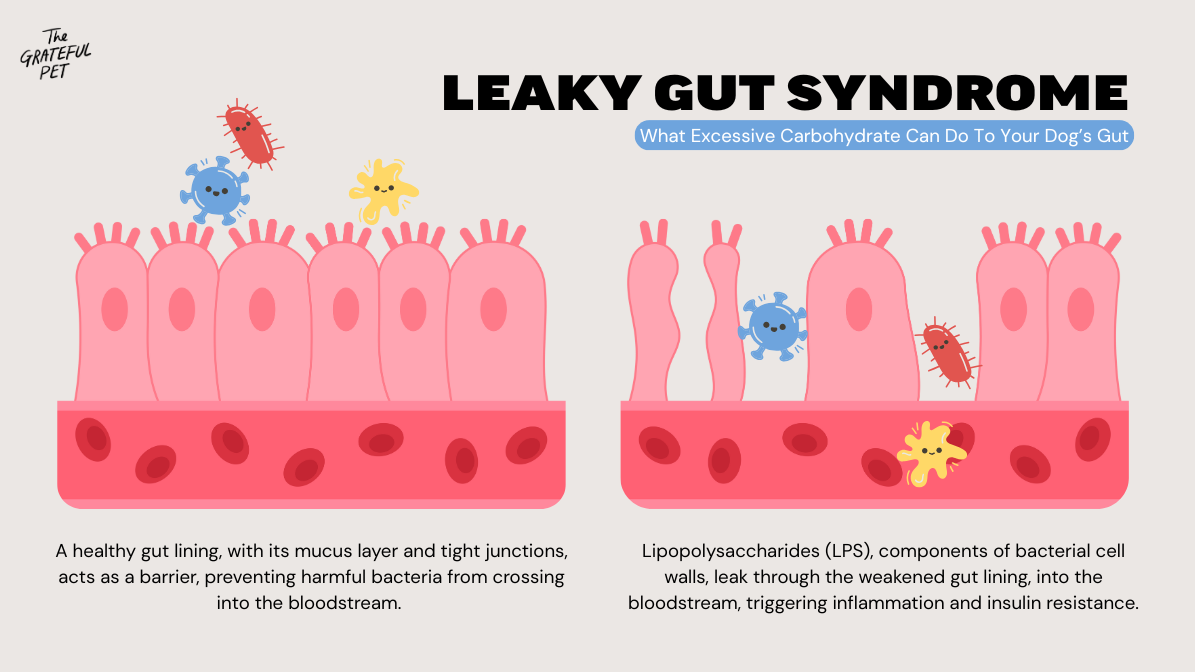Low Carb Diets for Dogs: What Commercial Pet Food Doesn’t Want You To Know

Have you ever stopped to consider what’s really in your dog’s food? While proteins and fats are often highlighted as the most critical nutrients in their diet, carbohydrates—even though not deemed essential by the Association of American Feed Control Officials (AAFCO)—dominate many commercial kibble diets. They show up in different forms, often as fillers such as corn, rice, or barley, making it difficult for pet owners seeking balanced nutrition or low-carb diets for dogs, to find suitable options.
Yet, beyond being unnecessary, these high-carbohydrate diets can have profound effects on your dog’s brain and body. Understanding how carbs impact your dog can help you make informed choices about their nutrition and long-term health.
The Deal with Carbohydrates and Dogs

Carbohydrates aren’t inherently bad for dogs. In reasonable amounts, they can provide a practical source of energy. However, the problem lies in the quantity. Using a dog’s ancestral diet as a model, the total amount of carbohydrates consumed by their evolutionary predecessors is dramatically lower than what’s become standard in modern kibble. One sensible estimate suggests natural carbohydrate consumption for a dog’s ancestors was around 14% of their total diet, whereas today’s dry dog foods often contain between 46% and 74% carbohydrates.
This drastic increase in carbohydrate intake has significant metabolic consequences, making it crucial for pet owners to be aware of how excessive carbs affect their dog’s health.
Carbohydrates, Oxidative Stress, and Inflammation
One of the significant concerns about carbohydrate consumption in dogs is the formation of Advanced Glycation End products (AGEs). AGEs are compounds that form when carbohydrates react with fats or proteins, a process accelerated by high-temperature cooking methods such as grilling, baking, frying, or extrusion—the process used to manufacture kibble to have it be more shelf-stable [1]. These AGEs, also referred to as glycotoxins, trigger an inflammatory response in the brain, particularly in hypothalamic neurons [2].
This inflammation is linked to several chronic diseases, including diabetes and cardiovascular disease [1]. The accumulation of AGEs increases oxidative stress, a process that damages cells and contributes to aging and degenerative conditions. The same oxidative stress mechanisms implicated in human health apply to dogs, making it essential to reconsider their dietary carbohydrate intake. Over time, chronic oxidative stress can impair cognitive function, accelerate organ degeneration, and contribute to immune dysregulation, making dogs more susceptible to infections and inflammatory disorders.
Furthermore, heat-processed carbohydrates in kibble contribute significantly to glycation, particularly when combined with fats, leading to a greater production of AGEs. These compounds not only accelerate cellular aging but also contribute to the development of metabolic disorders, increasing the risk of obesity, insulin resistance, and joint degeneration [3].
Carbohydrates and Gene Expression Changes
The effects of carbohydrates extend beyond inflammation; they can also influence how genes are expressed. When dogs consume a diet rich in low-quality, high-glycemic carbohydrates, it can upregulate genes linked to stress levels, immune responses, and the interleukin pathway [4].
Interleukin production plays a crucial role in immune function, being triggered by infections and antigens. However, excessive or uncontrolled production can lead to unintended cellular behaviour, such as increased cell division (a hallmark of cancer), cellular malfunction, or even cell death.
Additionally, this overproduction of cytokines can contribute to autoimmune disorders by disrupting immune signalling, leading to chronic inflammation and immune dysfunction [5].
Neural Activity Disruptions in the Hypothalamus
The hypothalamus is a vital brain region responsible for regulating hunger, thirst, and energy balance. It plays a critical role in preventing metabolic disorders like obesity and type 2 diabetes. Hypothalamic neurons process signals related to nutrient intake and hormone regulation, ensuring that the body maintains stable metabolic functions.
When a dog consumes a high-carbohydrate diet, excessive sugar intake leads to oxidative stress and inflammation in these neurons. Over time, this inflammation disrupts the hypothalamus’s ability to regulate appetite and metabolism properly, increasing the risk of insulin resistance, obesity, and metabolic imbalances.
High-carbohydrate and high-fat diets stimulate inflammatory responses in the hypothalamus, such as microgliosis—an abnormal activation of microglial cells in the brain—which leads to neuronal dysfunction and impaired energy regulation [2].
When the hypothalamus is inflamed, it loses its ability to properly regulate metabolism, potentially leading to weight gain, insulin resistance, and other metabolic imbalances. The long-term effects of this dysregulation can make it more challenging for dogs to maintain a healthy weight and overall well-being.
Carbohydrates and Gut Dysbiosis
A high-starch, high-fat diet also alters gut microbiome balance, favouring the increase of Firmicutes bacteria. While Firmicutes are a natural part of the gut microbiota, an overgrowth can disturb intestinal homeostasis. The gut lining—comprised of enterocytes and supported by tight junction proteins—acts as a barrier, preventing harmful substances from entering the bloodstream.
When carbohydrate-heavy diets alter bacterial composition, they can weaken this barrier, increasing permeability and leading to a condition known as leaky gut syndrome.

As a result, lipopolysaccharides (LPS), components of bacterial cell walls, can leak into the bloodstream, triggering inflammation and insulin resistance [6]. This systemic inflammation not only exacerbates metabolic disorders but also contributes to chronic diseases, including liver dysfunction, obesity, and immune-related conditions.
The imbalance of gut bacteria can also impair nutrient absorption, depriving dogs of essential vitamins and minerals needed for optimal health.
Additionally, gut dysbiosis can lead to digestive issues such as bloating, diarrhoea, and food sensitivities [7]. This is due to the chronic inflammation in the gut that weakens the immune system over time, making dogs more vulnerable to infections and allergies. Maintaining a balanced gut microbiome is crucial for overall health, and excessive carbohydrate intake can significantly disrupt this delicate ecosystem.
Reducing Carbohydrate-Induced Damage
The good news is that dietary choices can significantly influence AGE accumulation, inflammation, and overall metabolic health. Avoiding AGEs can delay the onset of chronic diseases and premature aging in both animals and humans [1]. Here are some steps to minimise these risks:
- Choose fresh, minimally processed diets: Opting for gently cooked meals or raw diets with no unnecessary carbohydrates or fillers reduces AGE exposure significantly. Due to its high-temperature processing, kibble is one of the largest sources of these harmful compounds.
- Incorporate antioxidant-rich foods: Antioxidants help neutralize oxidative stress caused by AGEs. Fresh, pet-appropriate fruits and vegetables provide natural antioxidants that support overall health. Berries and leafy greens can provide powerful protective effects against AGE accumulation.
- Encourage regular exercise: Physical activity not only aids in weight management but also helps reduce AGE accumulation and inflammation by promoting better metabolic function [8]. Exercise supports cardiovascular health, helps maintain an ideal body weight, and reduces inflammatory markers associated with chronic disease.

While carbohydrates may seem harmless in a dog’s diet, scientific evidence suggests otherwise. High-carbohydrate diets contribute to oxidative stress, genetic dysregulation, hypothalamic inflammation, and gut microbiome imbalances—issues that can lead to chronic disease and premature aging. By making mindful choices in your dog’s diet, you can support their brain, body, and overall well-being for years to come with a low-carb diet. Prioritising fresh, biologically appropriate foods from trusted brands like The Grateful Pet, and minimising processed carbohydrates can have profound long-term health benefits, ensuring your pet thrives throughout their life.
Reference
[1] Advanced Glycation End Products in Foods and a Practical Guide to Their Reduction in the Diet—J Am Diet Assoc., June 2010 https://pmc.ncbi.nlm.nih.gov/articles/PMC3704564/
[2] Dietary sugars, not lipids, drive hypothalamic inflammation—Mol Metab., June 2017 https://pmc.ncbi.nlm.nih.gov/articles/PMC5518723/
[3] The role of glycation in the pathogenesis of aging and its prevention through herbal products and physical exercise—J Exerc Nutrition Biochem., September 2017 https://pmc.ncbi.nlm.nih.gov/articles/PMC5643203/#
[4] Cancer immunotherapy focusing on the role of interleukins: A comprehensive and updated study—Meta Gene, March 2021 https://www.sciencedirect.com/topics/biochemistry-genetics-and-molecular-biology/interleukin
[5] High Glucose Intake Exacerbates Autoimmunity through Reactive-Oxygen-Species-Mediated TGF-β Cytokine Activation—Immunity, August 2019 https://www.sciencedirect.com/science/article/pii/S1074761319303279
[6] Gut microbiota, intestinal permeability, and systemic inflammation: a narrative review—Internal Emergency Medicine, July 2023 https://link.springer.com/article/10.1007/s11739-023-03374-w#
[7] Gut Dysbiosis in Dogs: Effects On Health—Bonza Dog https://www.bonza.dog/2023/07/gut-dysbiosis-in-dogs-effects-on-health/
[8] Exercise, Advanced Glycation End Products, and Their Effects on Cardiovascular Disorders: A Narrative Review—Heart and Mind, July 2022 https://journals.lww.com/hhmi/fulltext/2022/06030/exercise,_advanced_glycation_end_products,_and.6.aspx



